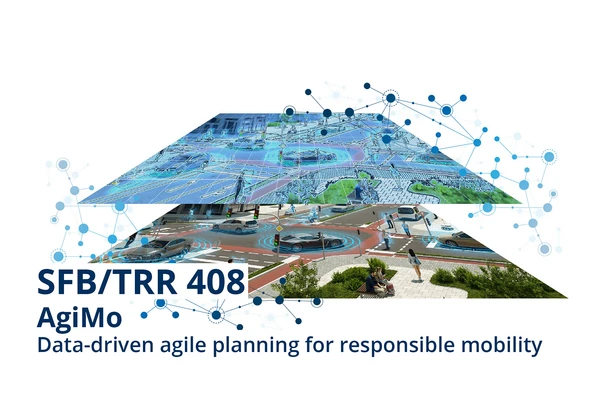Collaborative Research Center 'AgiMo' - Data-driven agile planning for responsible mobility
About
The Collaborative Research Centre (CRC) 'Data-driven agile planning for responsible mobility' (AgiMo) has been established by the collaboration between the Technical University of Munich (TUM), with the TU Dresden, TU Berlin, TU Braunschweig and the German Aerospace Center (DLR). The CRC is funded by the German Research Foundation (DFG).
This interdisciplinary centre, involving the four universities and the DLR, will conduct research on 20 research topics with 25 PhD candidates over the next years. The following research goals are pursued by this CRC:
Development of a new set of consistent scientific methods for mobility planning and management;
Integration of a new set of modular metrics for responsible mobility;
Embedding of the planning methods into the open data AgiMo Digital Twin;
Development of participatory planning methods based on the technical outcomes from the digital twin to create future scenarios for responsible mobility that are technically well-grounded and at the same time represent stakeholder preferences.
The integrated Research Training Group (RTG) will provide doctoral researchers with an attractive qualification program, foster networking, enable internationalization and mobility, and create a collaborative environment. TUM and the CRC embody a university culture that is characterized by cosmopolitanism, mutual appreciation, thriving innovation, and active participation. For TUM, diversity is an essential feature and a quality criterion of an excellent university.
Contributions of TSE
The Chair of Transportation Systems Engineering (TSE) will lead two pivotal subprojects in AgiMo CRC: A2 and C7.
Subproject A2: New methods for investigating stated behavior and preferences for extreme carbon reduction strategies
This project aims to develop a Stated Preference (SP) survey method that can quantify the impacts of extreme transportation strategies and policy measures, such as substantial increases in carbon pricing and road closures. The project also aims to understand the effects of these strategies and measures on modal share and activity participation. We will identify critical thresholds for behavioral changes (tipping points) under extreme scenarios and provide empirical evidence on the corresponding elasticities. Additionally, we will explore the significance of innovative SP communication methods, such as signposts, that activate respondents’ values. We will also assess the role of environmental awareness and nudges in promoting sustainable choices. Finally, we will investigate empirical methods to validate SP results and encourage sustainable travel behavior.
Subproject C7: Data-flexible calibration of large-scale transportation simulation models
One of AgiMo's main outputs is a digital twin based on MATSim, and large amounts of heterogeneous data will also be collected. The performance of such a system depends heavily on calibration, which becomes more challenging with rich data. The primary research question for this project is: How can we address data heterogeneity and model uncertainty to provide a transferable, automated calibration pipeline? Thus, the goal of this project is to extend the state of the art by developing an automated calibration framework for the heterogeneous microscopic transportation demand models used within AgiMo.
The core objectives are (i) framework generalizability, (ii) uncertainty quantification, and (iii) automating calibration heuristics. The platform will have a modular calibration pipeline design to allow flexible integration with different components for various applications, including (i) different data sources, (ii) optimization algorithms, and (iii) performance measures. The project will develop novel, simulation-efficient calibration methods that leverage state-of-the-art machine learning techniques, such as Bayesian learning. These methods will support effective uncertainty quantification.
